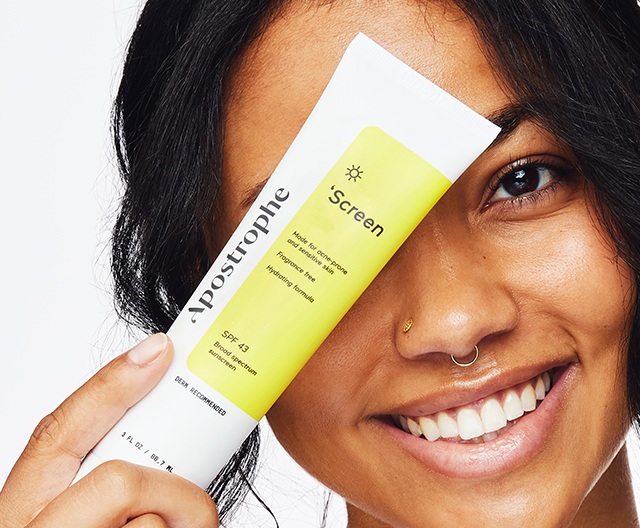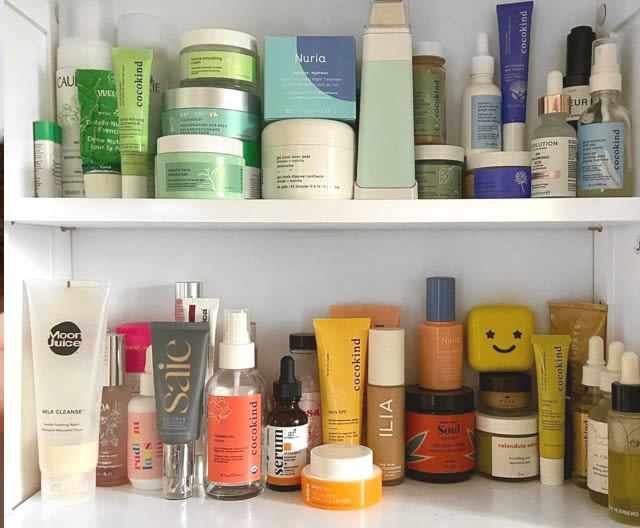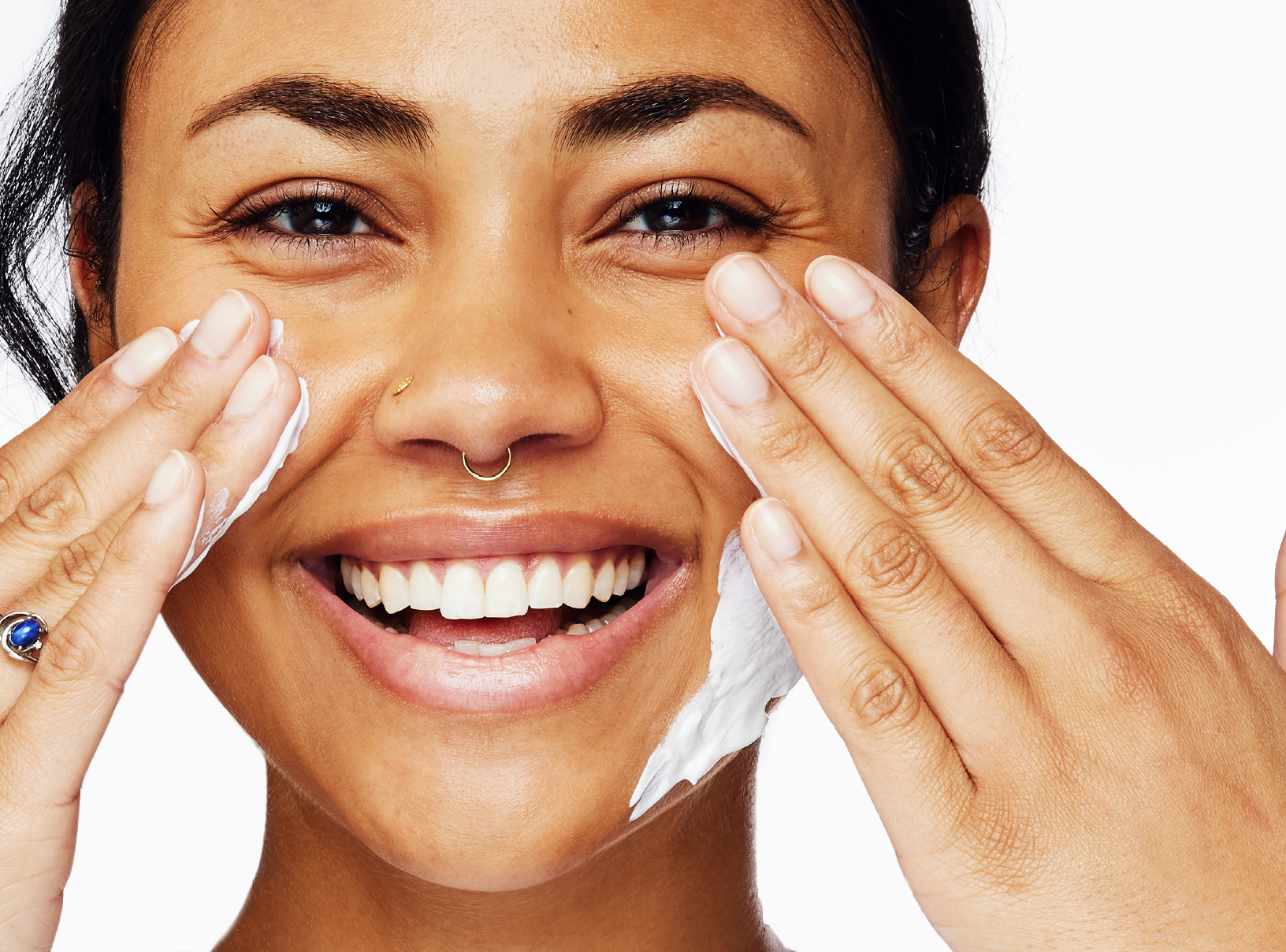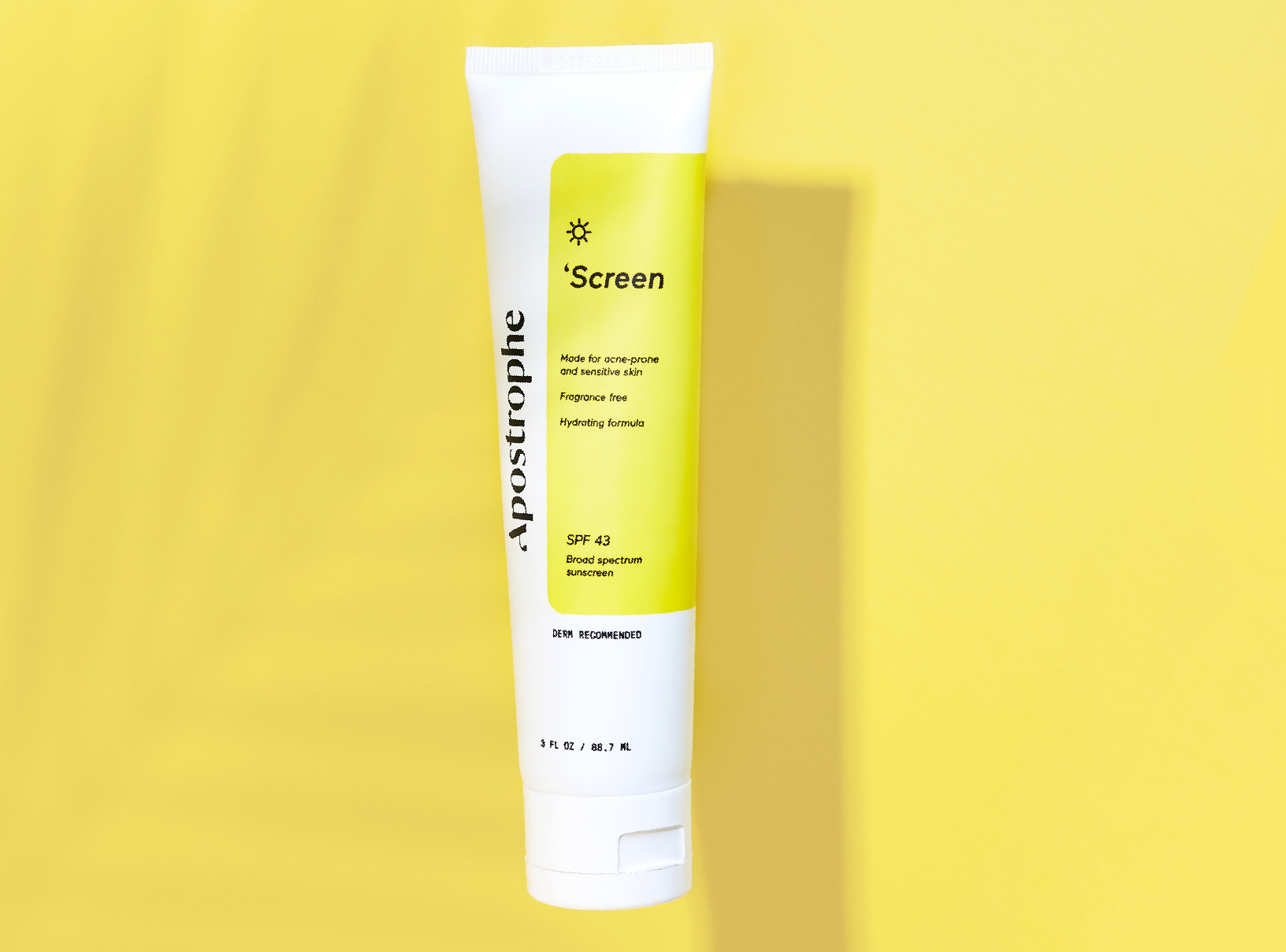Education
Best Sunscreen For Your Face


SHARE
Education
Best Sunscreen For Your Face
Medically reviewed by Katelyn Hagerty FNP
Written by Apostrophe Team
Last updated 4/5/2024
Everyone needs sunscreen. No matter how old you are or where you live, it’s a necessary part of your skincare routine. It’s also sometimes (mistakenly) believed that people with dark skin or people of color don’t need to worry about wearing it, but that’s incorrect.
The benefits of sunscreen for everyone can’t be overstated. When used correctly it can decrease your risk of skin cancer.
In fact, using an SPF 15 daily can lower your risk of squamous cell carcinoma (a type of skin cancer) by 40 percent and your risk of melanoma (another type of skin cancer) by 50 percent.
Not only that, but it can also help to prevent sun damage that leads to premature skin aging — think wrinkles, sagging, and brown spots. Sounds pretty good, right?
Of course, all of this is predicated on the fact that you have to use it correctly and you have to use the right type. To help you do just that, we’re reviewing exactly what you should be looking for when it comes time to shop for sunscreen.
Follow the below guidelines, then shop for the type of facial sunscreen that appeals to you most — whether it be one of those spray sunscreens, a moisturizer with SPF, a classic sunscreen or beyond.
Physical or Chemical Ingredients
Sunscreens fall into one of two categories: physical or chemical.
The first incorporates ingredients like titanium dioxide or zinc oxide, which block and scatter a small percentage of sun rays before they can penetrate your skin. The rest of the sun rays are absorbed and dissipated. Sometimes, physical sunscreens (also referred to as mineral sunscreens) can leave a white cast on your skin.
Chemical sunscreens incorporate ingredients like avobenzone and octisalate. These sunscreen filters do not block UV rays - they absorb all UV rays before they hurt or damage your skin.
By calling this type a chemical sunscreen can be a little confusing because it seems to imply that physical sunscreen is more “natural.” But active ingredients in both physical and chemical sunscreens are chemically derived — and totally safe.
Broad-Spectrum Protection
Look for the words “broad-spectrum” or “broad-spectrum protection” on any bottle of sunscreen you purchase. This means it protects from both UVA and UVB rays.
UVB rays tend to be responsible for causing redness and burns. They also play a larger role in causing skin cancer. That said, UVA rays can also lead to skin cancer.
In addition to this, UVA rays are what can cause premature aging. Within sunlight, there are about 500 times more UVA rays than UVB.
SPF 30 or Higher
Every sunscreen is labeled with a sun protection factor, more commonly known as SPF. Those letters are always followed by a number.
This number indicates how long it would take the UVB rays of the sun to burn your skin if you use the formula as instructed.
Basically, you multiply the amount of time it would normally take to burn your skin without sunscreen with the SPF number you have.
So, if you use an SPF 30 sunscreen and you were in sun that would normally burn your skin in 10 minutes, it would, in theory, take 300 minutes for that same sun to burn your skin while using that sunscreen.
Or if you were laying out in sun that would take 15 minutes to burn your skin and you used an SPF 15 sunscreen, it would theoretically take 225 minutes to burn your skin.
Hurray math!
All of that is just to say that the higher your SPF rating, the stronger protection you have against UVB rays.
None of that, however, is to say you shouldn’t re-apply sunscreen at least every couple of hours and after your skin gets wet.
The American Academy of Dermatology recommends always going with an SPF 30 or higher. But if you think choosing a very high number protects you more, you should know that may not be the case.
First, it’s important to remember that SPF only refers to protection from UVB rays, (not UVA). That’s why it’s important, as mentioned above, to make sure you’re looking at dual-spectrum or broad-spectrum sunscreens.
Also, a higher SPF may give you a false sense of security and make you forget to reapply — an important step in any protection routine. Sunscreen needs to be reapplied at least every two hours when outdoors — and sooner if you get wet or are sweating.
Water Resistant Benefits
Often, when you’re in the hot sun there will also be water around — in one form or another. You could be spending time at the beach, hanging by a pool or just sweating like crazy because it’s that hot out.�
And all that water can cause your SPF to wear off quickly. That’s why you should consider a sunscreen that’s water-resistant, too.
Also worth noting, being in the water can amplify the sun’s rays, making it even more important to wear sunscreen in the water.
Usually, sunscreens that have been put through water resistance tests can withhold 40 to 80 minutes of swimming. Even if you don’t max out that time, you should always reapply your sunscreen after coming out of the water (or, if you’ve been sweating a lot).
Skin Care Factors
When you choose a moisturizer for your face, chances are you consider what type of skin you have.
For example, you may pick something for sensitive skin or dry skin. Well, you should do the same when it comes time to purchase sunscreen.
For example, if you have acne-prone skin or oily skin, you may want to look for an oil-free sunscreen.
You can also look for the word non-comedogenic, which means it’s specifically designed to not clog pores and is great for those with acne-prone skin.
If you have dry skin, you can look for a moisturizer that contains hydrating active ingredients (like hyaluronic acid or lactic acid) along with SPF protection.
Choosing the Best Sunscreen For Your Face
Wearing sunscreen on your face is a must. Older people and younger people need it. People with lighter skin tones and darker skin tones need it. Daily sunscreen use is absolutely necessary to protect you from skin cancer and premature skin aging caused by sun damage.
When it comes to choosing the right formula, you can go for mineral sunscreens or chemical sunscreens.
The former may leave a white cast or white residue on your skin, though this is not always the case. The main difference is in how the active ingredients offer UV protection.
Both types will be effective as long as they’re an SPF 30 or above and offer broad-spectrum protection.
Whatever you need in a sunscreen, there are plenty of options — even facial sunscreens specifically formulated for different skin types.
By looking for the specifications listed above, you’ll be able to find your favorite sunscreen, whether it’s a spray sunscreen, tinted sunscreen, or a lightweight formula that sinks in quickly into the skin. If you’ve been looking for a derm-approved, acne-safe sunscreen, try ‘Screen!
Once you find it, you can start applying it daily. Experts say the amount you should use on your face and body should fill a shot glass. You’ll want a nickel-sized amount for your facial skin alone.
If you’re dealing with a skin condition, want specific recommendations on sunscreens for acne, or want an expert opinion of chemical or mineral sunscreens, you can always speak with a dermatologist about the options available to you.
We have a more detailed guide for protecting your skin from sunlight when using Tretinoin & Retinol.
6 Sources
All About Skin Cancer. Skin Cancer Foundation. Retrieved from https://www.skincancer.org/skin-cancer-prevention/sun-protection/sunscreen/
Ginzburg, A., Blackburn, R., Santillan, C., et al., (2021). Zinc oxide-induced changes to sunscreen ingredient efficacy and toxicity under UV irradiation. Photochemical and Photobiological Sciences. Retrieved from https://link.springer.com/article/10.1007/s43630-021-00101-2
What is the Difference Between UVA and UVB Rays? University of Iowa Hospitals and Clinics. Retrieved from https://uihc.org/health-topics/what-difference-between-uva-and-uvb-rays
Sunscreen FAQs. American Academy of Dermatology. Retrieved from https://www.aad.org/public/everyday-care/sun-protection/sunscreen-patients/sunscreen-faqs
Should You Use a Very High SPF Sunscreen? The University of Texas MD Anderson Cancer Center. Retrieved from https://www.mdanderson.org/cancerwise/should-you-use-very-high-spf-sunscreen.h00-159460845.html
Ask the Expert: How Much Sunscreen Should I Be Using on My Face and Body? Skin Cancer Foundation. Retrieved from https://www.skincancer.org/blog/ask-the-expert-how-much-sunscreen-should-i-be-using-on-my-face-and-body/
Like what you just read? Sign up for our email list to get the scoop on skincare science delivered straight to your inbox.

Education
What is milia?
What is milia? Today, we’re jumping into one type of bump that you may have heard about most commonly in infants — milia.
Read More
Education
Best moisturizer for acne-prone skin
If you have combination acne-prone skin, figuring out which moisturizer is best for your skin might be tough. In this guide, we break down the best moisturizer for combination, acne-prone skin.
Read More
Education
How to build a face care routine
As you get into skincare, it might seem overwhelming, especially trying to figure out the order you're supposed to apply products in. Below, we detail how to build a face care routine for your skin!
Read More
